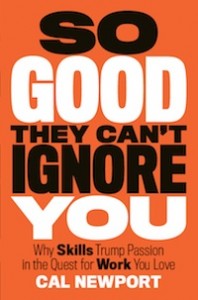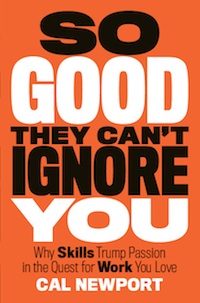First off: God I hope this book becomes popular. It’s not perfect, but an entire generation needs to hear its message.
I recently received a review copy of Cal Newport’s “So Good They Can’t Ignore You.” Newport achieved a cult following in the past couple of years while finishing his computer science PhD at MIT with his blog Study Hacks. Study Hacks has chronicled Newport’s quest for developing a cohesive hypothesis as to how to:
- Research patterns of success
- Develop “best practices” for studying or work
- Obtain Mastery over a topic
- Define the relationship between passion, happiness, and work
 The overarching, contrarian message of his blog, now distilled into So Good They Can’t Ignore You, is simple:
The overarching, contrarian message of his blog, now distilled into So Good They Can’t Ignore You, is simple:
“Follow your passion” is stupid advice for most people. (He probably wouldn’t put it that way but I will.)
But “follow your passion” is perhaps the most loudly trumpeted career advice given to everyone under 30. “Follow your passion” and you’ll find fulfilling careers, engaging co-workers, financial success, etc. There’s an entire industry of banal lifestyle marketing gurus encouraging everyone to quit their jobs and pursue lifestyle careers. Have the courage to quit your job and follow your passion will lead to great work. But as Newport points out:
“Great Work doesn’t just require great courage, but also skills of great (and real) value.”
Newport gives the example of a woman who had a successful career in advertising and marketing. But inspired by moronic lifestyle gurus, she quit her job to follow her passion of practicing yoga. She spent $4,000 and took a 200 hour “instructor” course. For anyone who has obtained some degree of mastery in a complex skill set, the idea that 200 hours will propel you to the level of “instructor” is ludicrous. For example:
- In training Yoshinkan Aikido, I easily spent 200 hours on practicing how to pivot. One of the most simple possible motions you can make with your body. Front foot planted, weight sinks down, back foot slides back and around in a 45 degree arc. I’ve spent an hour straight doing nothing but that motion again and again. Tens of thousands of repetitions. I look at my instructor perform the same basic movement. In comparison, mine is utter shit. Maybe with another 10 years of practice mine might be as good.
- In studying Brazilian Jiu-Jitsu (BJJ), most people just want to “roll.” That is, to actually competitively grapple until one person achieves a submission over the other person. It’s more fun. More alive. And while rolling is absolutely necessary to achieve any degree of mastery in BJJ – repetitive, dedicated drilling is just as important. Other people would roll or just leave class early and myself and my main training partner would stay and just drill the same basic arm-bar a dozen times, switch roles, ad nauseam. The result? We both had the fastest, smoothest arm-bars.
- In becoming a lawyer, law schools want you to delve into complex theoretical legal hypotheticals that are favored by career long academics. Law schools claim this makes you a good lawyer. But the relationship between the study of law and the practice of law is nebulous at best. I learned much, much more about the practice of law while working 40 hours at a law firm while attending law school. The day-in, day-out drudgery that it can bring. Document review, hours on the phone, never ending emails, etc. Actually, much of law school was a hindrance.
But after obtaining my black belt did I consider myself a master? When I received my J.D. and passed the Bar did I consider myself an expert lawyer? Of course not. They’re ridiculous questions.
Traditionally, a black belt has only meant one thing: you were now considered a serious student. Everything before was playtime. Training wheels. Getting a black belt only signifies that you have mastered the basics and are ready to begin dedicated study. The same is true with a J.D. Having a J.D. doesn’t indicate mastery of the law. It doesn’t guarantee you success, a six-figure job, or celebrity. It’s just a signifier that you are ready to step onto the playing field. What follows is up to you.
And passion is probably not going to get you very far. As Newport notes:
“The downside of the passion mindset is that it strips away merit…launching a career that gives you control, creativity, and impact is easy…Career-capital theory disagrees. It tells us that great work doesn’t just require great courage [to follow your passion], but also skill of great (and real) value. When [the woman] left her advertising career to start a yoga studio, not only did she discard the career capital acquired over many years in the marketing industry, but she transitioned into an unrelated field where she had almost no capital.
The result? The woman texts: “‘I’m at the food stamps office right now, waiting.’ It’s signed: ‘Sent from my iPhone.’”
What’s the Alternative?
Newport instead suggests a completely different mindset. Don’t follow your passion, instead focus on your work. Become dedicated to what you do. Delve into deliberate practice and work. Become a craftsman. Devote yourself to your practice or profession. As Newport notes, working from “finding your passion” asks what the world can do for you. Working at being a craftsman asks what can you give to the world. How to achieve this?
A quote from comedian Steve Martin captures what is needed to build a working life you love. From a 2007 interview with Charlie Rose when asked what his advice was for aspiring entertainers:
“Nobody ever takes note of [my advice], because it’s not the answer they want to hear. What they want to hear is ‘Here’s how you get an agent, here’s how you write a script,’ … but I always say, ‘Be so good they can’t ignore you.’”
4 Rules
To this end, Newport suggests 4 rules he and others have used to build their careers:
- Rule #1: Don’t Follow Your Passion. Here I make my argument that “follow your passion” is bad advice. You’ve heard me talk about this on Study Hacks, but in this chapter, I lay out my full-throated, comprehensive, detailed argument against this common advice.
- Rule #2: Be So Good They Can’t Ignore You. Here I detail the philosophy that works better than following your passion. This philosophy, which I call career capital theory, says that you first build up rare and valuable skills and then use these skills as leverage to shape you career into something you love. During this chapter I spend time with a professional guitar player, television writer, and venture capitalist, among others, in my quest to understand how people get really good at what they do. You’ll also encounter a detailed discussion of deliberate practice and how to apply it in your working life.
- Rule #3: Turn Down a Promotion. Here I argue that control is one of the most important things you can bargain for with your rare and valuable skills. I discuss the difficulties people face in trying to move toward more autonomy in their working lives and describe strategies that can help you sidestep these pitfalls. During this chapter, I spend time with a hotshot database developer, an entrepreneurial medical resident, an Ivy League-trained organic farmer, and Derek Sivers, among others, in my attempts to decode control.
- Rule #4: Think Small, Act Big. In this final rule, I explore how people end up with career-defining missions — often a source of great passion. I argue that you need rare and valuable skills before you can identify a powerful mission. I then spend time with a star Harvard professor, a television host, and a Ruby on Rails guru, all in an effort to identify best practices for cultivating this trait.
The book then delves deeply into each Rule, laying out example after example as to why hard work and deliberate practice are key to finding happiness and success in your work.
Is it a perfect book? No. Almost everyone Newport profiles are people who were already on successful trajectories anyway. Ivy Leaguers, etc. His prose is a bit rough around the edges and doesn’t exactly flow naturally from section to section. The book also sometimes feels assembled from individual components instead of one comprehensive narrative. But it’s message is clear and valuable.
You could probably get a lot of the same material and messages from spending hours navigating through his blog. But it won’t be structured and laid out for you in one convenient package. If you’re one of the millions of Gen Y floundering around searching for passion in your life, do yourself a favor and just buy this book.
Highly recommended.
Click here to buy it now*Affiliate link.














